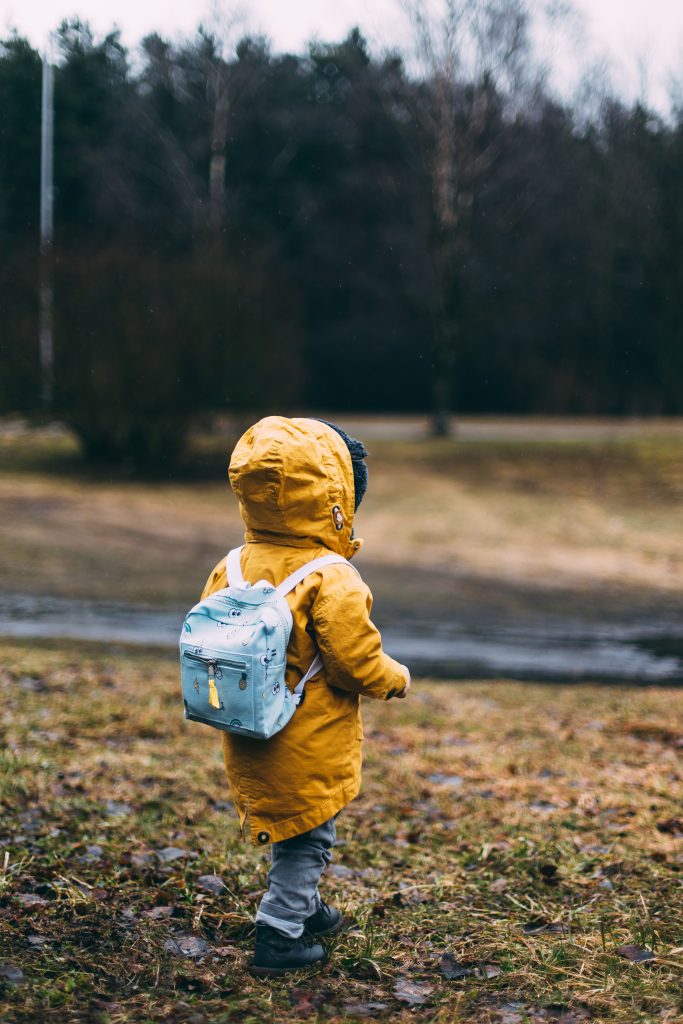“A thing must be loved before it is loveable,” Chesterton wrote.[i] He said this was the great theme of Beauty and the Beast—a story that is magical, not because a beautiful princess gets kissed (after all, beautiful women are kissed every day) but because a hideous monster is embraced while he is still a hideous monster.
By the time Belle shows up at the Beast’s castle, he can’t hope to be wanted by anybody. He’s too wretched. Too damaged. Each time the Beast begins to approach vulnerability, he shrinks back with the lonely despair of a human who believes that he could never be loved. Yet the Christ figure of the story, Belle, is determined to cross that gulf. Her grace displays a magic greater than any fairy godmother’s bibbidi-bobbidi-boo because she is showing us a metaphor for the gospel: “God shows his love for us in that while we were still sinners, Christ died for us.”[ii] He pursued us while we were still ugly Leah, still worn-out Shulamite, still Average Jane.
God brought me face-to-face with his preemptive love during the early days of our adoption. In that first stage of the process, we had no name, no photograph, no idea which child would be ours, and I was scared. The stakes were high, after all. We were committing the rest of our lives, the whole of our family, to a kid we didn’t know.
Still, the feeling that someone was out there waiting for us persisted. Eventually, I started having a recurring dream in which I was standing behind a barrier of yellow, soundproof glass, watching fifteen or twenty babies crawling on the floor in an industrial-looking room. Furnishings were sparse—a bare table, a steel chair, a light bulb hanging by a wire. I could see the kids, but I couldn’t hear them, and that silence was awful.

A dark-eyed child with close-cut hair sat still and stared up at me. He scooted my direction and lifted his arms as if he wanted me to hold him, so I walked the length of the wall, trying to find the edge. Yet the further I walked, the thicker the glass grew. Desperate to reach him, I finally reared back and threw my shoulder against the wall, trying to break it, and that’s when the dream would end. I would lurch upright in bed, covered in sweat, then stumble to my laptop in the dark to search adoption agency websites.
In those early hours, I would scroll through profiles of waiting children, reading cases listed by snapshots. Some kids were natural charmers with big smiles and mischief in their eyes. Others looked vacant, wounded, or defiant. What are you supposed to do with that difference as an adoptive parent? Every kid takes a weird picture now and then—once my oldest son decided to scowl through an entire family wedding. If another mom saw only one image from that event, what would she think of my son? Would she assume that he had anger issues? Would she write him off as a tough case? How was a waiting child supposed to understand that his or her entire future might hinge on a two-second snapshot?
One of the boys stared wide-eyed into the camera, looking dazed. I wondered if he ever laughed—or if he didn’t, what it would take to help him learn how. A pretty little girl with fat, red cheeks had an easy, open grin that promised she would melt seamlessly into any family. Her foster parents must have adored her because she was dressed like a princess. Three gangly tweens made peace signs with their fingers, but hunched shoulders betrayed their insecurity. A child with a burned face wouldn’t lift his chin.
On one website, children were labeled by an American nickname plus a medical condition. Lucy—Spina bifida. Charlie—Hepatitis. Margaret—Clubfoot. A label like that would open or close doors because certain adoptive families waited years for the youngest possible baby with no medical problems. One of my biological kids was born with a heart defect, and my husband was born with a club foot, so it offended me to see people like us described as specimens. And yet, did we have the resources to care for every child I wanted to bring home? No. Parents pursuing special-needs adoptions will often tell you that the hardest part of the whole process is sitting at your kitchen table, filling out the checklist that separates the medical conditions you can provide for from those you can’t. Every box you don’t check feels like a son or daughter lost.
I was overwhelmed and scared in so many ways during those months—scared of being too reckless and scared of being too careful. But in that emotional tug of war, our calling was eventually solidified. Longing to be with our son began to outweigh my fears of making a mistake. As the thought of our boy became real, I prayed for every finger, every toe, every bone, every memory. Appeals to the Father rose from me like contractions.
It’s crazy looking back on all that now. Seven years have passed, and today is a lazy Saturday morning at our house. Our youngest son is playing in the next room over. He’s singing a made-up tune with made-up words, and he is so chilled out and peaceful, the sound of his voice makes me a little sleepy. How did we ever live without him? Why was I ever so afraid?
Before we brought M home, I heard other families joke about forgetting that their kids had been adopted, but that seemed impossible. How could you forget something like that? Now that I’ve been through it, though, I get what those parents meant. Regular life kicks in, and you spend hundreds of days doing what families do. You read stories; you pack lunches. You go to ballgames and swimming lessons. “That kid” becomes “your kid,” so that when you see little brown legs running across the lawn, they feel familiar and right—even if your own legs are pink. Of course, I never forget all the paperwork and travel required to adopt M, but a parallel emotional reality runs alongside those memories—a reality in which we seem to have always been together.
On the hot summer day when we finally met our son, I buried my nose in his sweaty black hair, breathed him in, and was shocked to realize that he smelled like one of my own. Even his weight was familiar. I hadn’t expected that. I had been told that our transition would take months of getting used to one another, that he would feel foreign and different—but from first contact, this was already my boy.
He was barely three years old that day, and for about a minute, he screamed at the newness of being handed to a strange family. But when he saw that we had Teddy Grahams and Play-Doh, he was ready to have some fun. The big kids sat down to play with him, and those three were soon a big mess of giggles. Our oldest son taught M that his big sister’s name was “Grandma.” When his sister protested in shock, M got the joke and pushed it, “Grandma! Grandma! Grandma!” Two brothers ganging up on the sister. Weird sense of humor. Yeah, this was going to be a perfect fit. The first day of an adoption isn’t always like this, and stories of tenacious love are beautiful in a different way. But for whatever reason, our bond was cake.

Experts had told us not to give our son rich foods after bland orphanage fare, but when we stepped off the bus near our hotel we saw a McDonalds, and I caved instantly. “Diarrhea, schmiarrhea,” I said. “Let’s get ice cream.” He dipped his fries in his cone, humming with delight, and I thought I was going to explode from happiness watching him. Finally, he was close. Finally, I could relax. Here was the child of our long labor—the son that the Lord had buried deep in my heart was now at my side.
But as beautiful as those early days were, we also began to notice an odd pattern. M rarely cried when he was hurt or sad. When he felt upset, he would either hide behind a chair until he collected himself or put on a goofy performance to make everyone (including himself) laugh. Sure, this was cute, but something about it didn’t feel right.
I started working through a list of bonding exercises, just to see if they would help M relax more completely. A social worker had told me to gently wrap M in soft blankets, giving him a sippy cup while rocking him like a baby. (Apparently, muscles used in swaddled sucking grow connections in the brain.) I wore a tank top and held his skin against my arms and neck for long stretches. I counted his toes over and over, playing the piggy game. We crawled on our knees like babies, and I massaged his legs and arms with lotion after a bath. We played in water, dug our arms down deep in rice, and smeared around finger paints. With slow intentionality, we walked back through all the stages of infancy, one day pretending that M was a month old, then two months old, then six. We asked God to help us heal what had been lost.
In certain overseas orphanages, caregivers aren’t allowed to snuggle with infants. The no-contact rule is enforced because held babies cry to be held more, and crying babies make more work for facility workers. The world’s worst orphanages have rooms with beds full of silent infants because those children have learned that no comfort will come to them when they wail. Of course, such isolation is damaging. God made the needs of babies and the instincts of mothers to work in harmony. When a mother plays with her baby’s pretty feet or smoothes his soft hair, she is helping his brain understand its relationship to his body. A child who doesn’t have this sort of contact cannot develop that understanding properly. This is why children who aren’t held in the beginning of life sometimes wiggle constantly, banging into the world around them. They are looking for the edges of themselves.
Our son spent his first year of life in a facility that forbade snuggling, so we found an occupational therapist who taught us joint compressions and impact-oriented exercise. She encouraged us to spend afternoons jumping off walls, tumbling, wrestling, and working M’s bones. In the evenings, we would sit close together reading books. Through all of this, the soul that had been locked inside of our son began to break free.
One afternoon, M was climbing into bed when he fell off the mattress onto the floor. Falling is normal for a three-year-old, but what came out of M that day wasn’t normal. He let out the halted wail of a newborn. I ran to him, and he looked at me as if he wasn’t sure what was happening. When I scooped him up and held him in my arms, he buried his face into my shoulder and wept. My husband heard the commotion and found us.
“What happened?” he mouthed.
“I think this is a good thing,” I whispered back.
Almost immediately, I felt my son’s shame rise, and he began fighting his tears. His whole body started to stiffen, so I held him closer and told him, “I love you. You are such a good boy. This is a good cry. You are doing a good job crying! Cry more.”
One of the best compliments of my life was his decision to take me up on that offer. M relaxed and wept what felt like three years’ worth of tears. “I am so proud of you,” I said, rocking him and whispering praise and love over him until he was finished.
When all the tears were gone, the look in his eyes told me that he wasn’t sure what had just transpired. So I got out my laptop and searched for videos of newborns crying while their mothers comforted them. M was enchanted. As those tiny babies whimpered and wailed, I stroked the screen and said, “Good baby. Good cry.” With a little fat finger, my son also began to stroke the faces on the screen. He leaned over to kiss those babies, saying, “Good baby, good cry.” Every time a video ended, he asked to watch it again. From that day on, M cried when he needed to cry. He stepped bravely out of the rejection of his past, trusting his family with the reality of his pain.
Before M, I didn’t understand what fierce love God holds for those he has adopted into his family. I didn’t realize that when he pursues us, he knows all our damage and our defects—and he knows exactly where we rank on every system humans use to determine our value. He stares straight into all of the world’s opinions of us and yet proclaims that we are the wanted ones. No matter how anybody has let us down, hurt us, forgotten us, we are still longed for and beloved children.
Some of you will find this hard to believe because you have been labeled by your wounds and rejected. You have been judged by snapshots taken on your worst days and left alone to survive. For years, you’ve sat in the cinders, weeping, and no handsome prince has ever popped in to propose to you. On long, cold nights, you have fallen asleep in the ashes while trying to stay warm, and in the mornings, you have awakened filthy. By day, you have busted your bones working, only to get the heck beat out of you. You’ve worn yourselves down. You’ve worn yourselves ugly. You’ve learned to hide behind a chair, or find some way to make people laugh, or pretend to need nothing at all. After surviving so much for so long, how can you hope for anything else?
If that’s the case, maybe reaching for the full promise of the gospel is too much too soon. Maybe for now, you can just let the bonds of trust begin to grow between you and your Jesus. If you are wary of giving your whole heart away to him, dig around in his story, and get to know this person who lived as a broken man among broken men. Read about the night he stood alone in the dark after all his friends ran away, and read about the day he stood in front of a hateful crowd that shouted, “Give us Barabbas.”[iii] See how he grieved, and was lonely, and got tired sometimes.
Seven hundred years before Jesus’ birth, the prophet Isaiah described the earthly life of the Messiah this way:
He had no form or majesty that we should look at him, and no beauty that we should desire him. He was despised and rejected by men, a man of sorrows and acquainted with grief; and as one from whom men hide their faces he was despised, and we esteemed him not. Surely he has borne our griefs and carried our sorrows; yet we esteemed him stricken, smitten by God, and afflicted.[iv]
So when you pray, you pray to someone who knows how it feels to be unattractive and abandoned. You pray to someone whose life was so full of hurt that he was called a “man of sorrows.” He was hated so much, people hid their faces from him. He was so disgraced, the public thought he was smitten by the hand of God.
When the world tells you that you don’t deserve love, know that this accusation landed inside Jesus. When it tells you that you are too plain, too fat, too addicted, too old, too slow, too damaged—believe that he knows the blunt force of every word. And unlike all the humans you’ve known, he isn’t the least bit discouraged by your homeliness. He knows that “a thing must be loved before it is loveable,” and he knows that loving you into beauty is his business. In fact, he loved you long before your first rejection.[v] Even before the creation of the world, he had a vision of the glorious being he would make of you—someone who is holy and blameless in his sight.[vi] When he looks at you, he sees what you will become, not just what you have been.

In other words, the fairy tales are true—you don’t have to be pretty, you don’t have to be smart, you don’t have to be important—you can come as a child of the cinders, only courageous enough to admit that you are tired of rejection and that you desperately need an affection that the world has never quite been able to give you.
Just like it was difficult for my son to learn to trust his mother, it’s going to be difficult for you to learn to trust the God who loves you. It’s okay if you have to go slowly and test to see who he really is before you leap. But at the end of this journey, I can tell you what awaits by telling you how my heart sang when my son finally found the courage to bury his sorrows in his mother’s love. In that moment, I could feel the love of his God coursing through me toward him—a Father who wants every orphaned soul to collapse in hope on his shoulder. This is the God who loves you. This is the God who chases you. And when you are ready to trust him, he will hold you close and whisper that you are home at last.
You’ve been reading with Rebecca Reynolds from Courage, Dear Heart: Letters to a Weary World. Dive deeper by reading chapter one or getting your copy of the book.
[i] Gilbert K. Chesterton, Orthodoxy (New York: John Lane Company, 1908), 89.
[ii] Romans 5:8.
[iii] John 18:40, NIV.
[iv] Isaiah 53:2-4.
[v] 1 John 4:10.
[vi] Ephesians 1:4.


I was adopted by my mother’s first cousin…it was the best thing that happened to me…loved by mama and papa…still knowing my siblings and loved by my biological parents…i was able to help them and support some of them with their needs…God has his purpose ALL PLANNED and it is for our good.